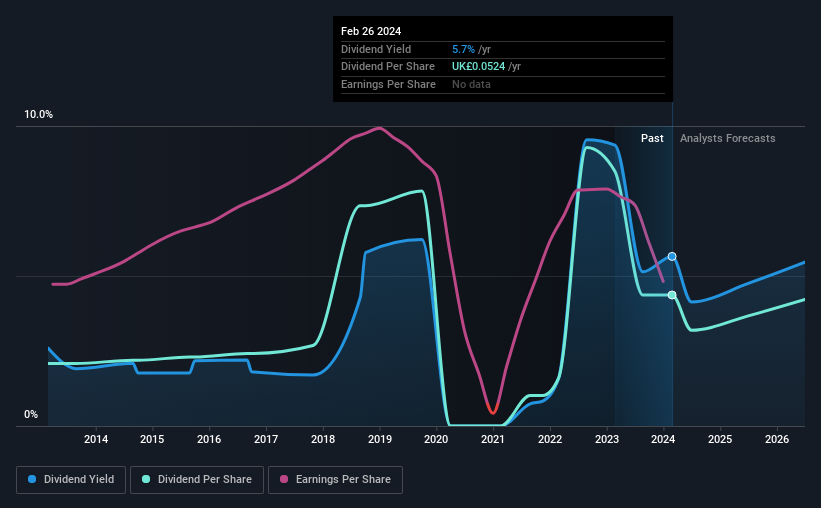Hays (LON:HAS) Has Announced A Dividend Of £0.0095
Hays plc (LON:HAS) has announced that it will pay a dividend of £0.0095 per share on the 9th of April. This makes the dividend yield 5.7%, which will augment investor returns quite nicely.
Check out our latest analysis for Hays
Hays' Earnings Easily Cover The Distributions
A big dividend yield for a few years doesn't mean much if it can't be sustained. Prior to this announcement, Hays' dividend was comfortably covered by both cash flow and earnings. This indicates that quite a large proportion of earnings is being invested back into the business.
Looking forward, earnings per share is forecast to rise by 88.6% over the next year. Assuming the dividend continues along recent trends, we think the payout ratio could be 53% by next year, which is in a pretty sustainable range.
Dividend Volatility
The company's dividend history has been marked by instability, with at least one cut in the last 10 years. Since 2014, the dividend has gone from £0.025 total annually to £0.0524. This implies that the company grew its distributions at a yearly rate of about 7.7% over that duration. It's good to see the dividend growing at a decent rate, but the dividend has been cut at least once in the past. Hays might have put its house in order since then, but we remain cautious.
Dividend Growth Potential Is Shaky
With a relatively unstable dividend, it's even more important to evaluate if earnings per share is growing, which could point to a growing dividend in the future. Hays' earnings per share has shrunk at 15% a year over the past five years. This steep decline can indicate that the business is going through a tough time, which could constrain its ability to pay a larger dividend each year in the future. Over the next year, however, earnings are actually predicted to rise, but we would still be cautious until a track record of earnings growth can be built.
In Summary
In summary, while it's good to see that the dividend hasn't been cut, we are a bit cautious about Hays' payments, as there could be some issues with sustaining them into the future. In the past, the payments have been unstable, but over the short term the dividend could be reliable, with the company generating enough cash to cover it. We would be a touch cautious of relying on this stock primarily for the dividend income.
Market movements attest to how highly valued a consistent dividend policy is compared to one which is more unpredictable. However, there are other things to consider for investors when analysing stock performance. For instance, we've picked out 2 warning signs for Hays that investors should take into consideration. Is Hays not quite the opportunity you were looking for? Why not check out our selection of top dividend stocks.
Have feedback on this article? Concerned about the content? Get in touch with us directly. Alternatively, email editorial-team (at) simplywallst.com.
This article by Simply Wall St is general in nature. We provide commentary based on historical data and analyst forecasts only using an unbiased methodology and our articles are not intended to be financial advice. It does not constitute a recommendation to buy or sell any stock, and does not take account of your objectives, or your financial situation. We aim to bring you long-term focused analysis driven by fundamental data. Note that our analysis may not factor in the latest price-sensitive company announcements or qualitative material. Simply Wall St has no position in any stocks mentioned.

 Yahoo Finance
Yahoo Finance 
